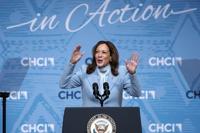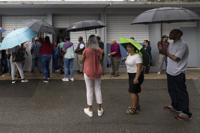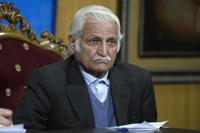WASHINGTON (AP) — A solid majority of Hispanic women have a positive opinion of Vice President Kamala Harris and a negative view of former President Donald Trump, but Hispanic men are more divided on both candidates, according to a recent poll from The Associated Press-NORC Center for Public Affairs Research.
Hispanic men are also more likely than Hispanic women to say Trump is the candidate who represents their views on key issues, underscoring the potential importance of this group, which both candidates have courted aggressively.
As the election approaches, the extent to which Trump can erode Harris' support among Hispanic voters could be an important factor in swing states like Arizona. Hispanic voters are more supportive of the Democrats overall: According to the poll, nearly half identify as Democrats, about one-third as Republicans, and around 2 in 10 as independents. But the poll signals that Hispanic men, while not overwhelmingly in favor of Trump, are more open to his candidacy than Hispanic women — and less open to Harris'.
Antonio Melcon, 65, a Republican from Florida, said Trump has his vote because he is the best option for the country. In Melcon's view, the Biden administration has taken the nation down a bad path, and Harris has done nothing to stop it.
“She wasn’t the one that implemented the route this country has taken, but she’s been there and done nothing that merits I vote for her,” Melcon said. “I would definitely never vote for her.”
Hispanic men and women have different views on Harris
Overall, Hispanic voters are about equally likely to say they have a favorable view of Trump and Harris. But there is a gender divide among Hispanic voters on Harris: About 6 in 10 Hispanic women have a somewhat or very favorable opinion of Harris, compared to 45% of Hispanic men.
Similarly, about half of Hispanic women voters think Harris would make a good president, compared to only about one-third of Hispanic men.
For some voters, one candidate may appear in a better light simply because they dislike the alternative. Sonia Montoya, a 68-year-old Democrat from Chicago, said while she agrees with many of Harris’ policies, she still sees Harris as the lesser of two evils. Montoya said Harris is more human and has a better understanding of society, while she views Trump as “arrogant, a liar, a cheater.”
In addition to having warmer feelings toward Harris, about 6 in 10 Hispanic female voters say Trump would not make a good president, compared to about half of Hispanic male voters.
And Hispanic men are likelier than Hispanic women to think Trump has the toughness the presidency requires. About half of Hispanic men say “tough enough to be president” describes Trump extremely or very well, compared to about one-third of Hispanic women. Hispanic men are also more likely than Hispanic women to say Trump is the candidate who represents their views on important policies.
Plenty of Hispanic men, though, remain supportive of Harris and skeptical about Trump. Sebastian Diaz, 51 and an independent from Massachusetts, views Harris “somewhat favorably” because he agrees with her ideology. He said he has a “very unfavorable” view of Trump because he is “a racist bigot.”
The economy is a high priority for Hispanic voters
Despite some divisions in views of the candidates, though, Hispanic voters are largely in agreement that the economy is a major factor as they consider their options for president. Around 8 in 10 Hispanic voters say the economy is “one of the most important issues” during this election season.
Daysi Garcia, 44, a Republican from Pennsylvania, said groceries have gotten so expensive that the candidates' economic plans are guiding her vote. A self-proclaimed Democrat until last year, Garcia said while she does not agree with all of Trump’s policies, she is unhappy with the Democrats and thinks Trump would be a better choice to run the country.
“It is so bad right now,” Garcia said. “It is so hard to do grocery shopping because everything is through the roof. I don’t remember ever seeing everything skyrocket the way it is now.”
Melcon agrees that the cost of living is too high. “The economy is the main thing for me,” he said. “The environment, immigration — which is also a problem — that’s second fiddle.”
About 6 in 10 Hispanic voters also say that health care or crime are among the most important issues for their vote, while about half say that about gun policy. Slightly less than half say abortion or immigration are among the most important. Hispanic voters are more likely than voters nationwide to see health care as a top voting priority.
Diaz said health care, like food and water, is a basic need for humans.
“I think universal access to healthcare is incredibly important for the social development of a country,” Diaz said.
More Hispanic voters think Harris represents their culture
Harris has one potential advantage over Trump among Hispanic voters: About 4 in 10 say she is the candidate who better represents their background and culture, while about one-quarter say this about Trump. A sizable share are unconvinced that either candidate fits into this role, though: About 3 in 10 say neither candidate represents their background and culture.
may give some Hispanic voters a sense of representation, civic engagement advocates say, even though she's not Hispanic herself.
Montoya said as someone who is biracial, Harris represents her identity best. “She knows what it feels like to be insulted or put to the side or feel worthless because of prejudice in this world,” Montoya said. “I think she’ll fight harder for us than (Trump) ever would.”
___
Figueroa reported from Austin.
___
The poll of 1,771 registered voters was conducted Sept. 12-16, 2024, using a sample drawn from NORC’s probability-based AmeriSpeak Panel, which is designed to be representative of the U.S. population. The margin of sampling error for registered voters is plus or minus 3.4 percentage points.








































